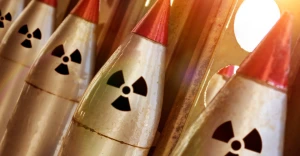
UK intelligence describes Russian media reaction to Prigozhin's rebellion, downplayed its significance
UK intelligence has analysed how Russian propaganda media covered the armed rebellion by Wagner PMC mercenaries led by Yevgeny Prigozhin. According to experts, this happened in three stages
This is stated in a report by the UK Ministry of Defence.
According to the ministry, at first, Russian television continued to work according to the usual schedule because it was unprepared for the coup attempt. After the end of the Wagner PMC's coup attempt in Russia, state media tried to "correct" statements about the passivity of the security forces.
The Russian media also tried to unite the country around Putin.
"Narratives promoted the idea that President Vladimir Putin had triumphed by thwarting the insurrection, while avoiding bloodshed, and sought to unite the country behind the president," the British intelligence service said.
A week after the rebellion, the media began to downplay the importance of Wagner's leader, Yevgeny Prigozhin, and the rebellion, as well as defame his person.
The British Ministry of Defence added that Wagner's Telegram channels had largely gone silent, almost certainly due to state interference.
In contrast, Putin has taken on an unusually high public profile in order to demonstrate his power, the ministry added.
Prigozhin's mutiny in Russia
For several months, there has been a conflict between Yevgeny Prigozhin, the financier of Wagner PMC, and the Russian Ministry of Defense. However, the situation escalated quickly on the evening of June 23.
Allegedly, Russian troops launched a missile attack on the Wagner base. Yevgeny Prigozhin, the leader of the Wagner PMC, announced a "march of justice" and stated that 25,000 mercenaries were heading to Moscow after the Russian leadership refused to hand over Defense Minister Sergei Shoigu and Chief of the General Staff Valery Gerasimov.
On June 24, Wagner’s fighters took control of Rostov-on-Don, where they initially gathered around the headquarters of the Southern Military District, and then entered the city of Voronezh. Their convoys, which had diverted from the Ukrainian border, were moving towards Moscow. Military aircraft and artillery under Shoigu's control attempted to stop them. The units of Wagner PMC were last spotted in the Lipetsk region. In Moscow itself, defensive positions were established, trenches were dug, and all security forces were mobilized.
However, on the evening of June 24, the press service of the self-proclaimed President of Belarus, Alexander Lukashenko, released a statement in which the head of the Wagner PMC stated that he was ready to stop the advance of his mercenaries' military convoys, which were already approaching Moscow, and to reach an agreement with the Kremlin. Prigozhin allegedly agreed on this during a conversation with Lukashenko.
Subsequently, Prigozhin and all his fighters left the headquarters of Russia's Southern Military District. Russian leader Vladimir Putin promised that Prigozhin would be able to go to Belarus, and Russia would close the criminal case against him.
Read more on the events here.
On June 26, Russian media reported that the leader of PMC Wagner remained under investigation in the case of organizing a coup in Russia, despite the Kremlin's statements about closing the case.
On the same day, Putin gave a speech in which he offered the Wagner PMC fighters three options for future actions: join the Russian Defense Forces, go to Belarus with other PMC members, or return to their families.
Meanwhile, Wagner leader, Yevgeny Prigozhin, said that the main goal of the mutiny was "to prevent the destruction of the Wagner PMC, not to overthrow the government" and called it a "march of justice." He also claimed that the offensive on Moscow had stopped because the mercenaries "did not want to shed much blood."
On June 27, the Federal Security Service of Russia announced that it dropped the criminal case related to the armed plot, in which Wagner PMC leader Yevgeny Prigozhin was involved.
The Russian Ministry of Defense claimed that Wagner mercenaries would hand over heavy equipment to the regular Russian army.
On the same day, the self-proclaimed President of Belarus confirmed the arrival of Yevgeny Prigozhin in the country. According to him, the Wagner mercenaries who arrived with him would not guard the Russian tactical nuclear weapons stationed there.
The US alleges that Sergei Surovikin, the deputy commander of the Russian occupying forces, had prior knowledge of Yevgeny Prigozhin's plans to incite a mutiny in Russia. The Kremlin responded by dismissing the statement and saying that it was just "speculation."
On June 29, the FT wrote that the commander of the Russian Aerospace Forces and deputy commander of Russian troops in Ukraine, General Sergei Surovikin, could have been arrested following Prigozhin's failed coup. Russia and Surovikin’s daughter both denied the reports.
In an interview with the Washington Post on June 30, Ukrainian Armed Forces Commander-in-Chief Valeriy Zaluzhnyi said that due to the presence of Wagner PMC in Belarus, Ukraine may have to consider a new threat to its northern border and take appropriate measures.
And the head of the Main Directorate of Intelligence, Kyrylo Budanov, said that after the attempted mutiny in Russia, the FSB has the task of eliminating the owner of Wagner PMC, Yevgeny Prigozhin.
On June 30, media outlets reported that Roskomnadzor, the Russian media and internet censorship body, had blocked access to the websites of Yevgeny Prigozhin's Patriot media holding. The affected outlets within the holding have confirmed the termination of their websites.
On July 1, Ukraine’s Center for Countering Disinformation reported that Wagner mercenaries eliminated on Shoigu's order in Russian-held territories of Donetsk and Zaporizhzhia regions
- News














































